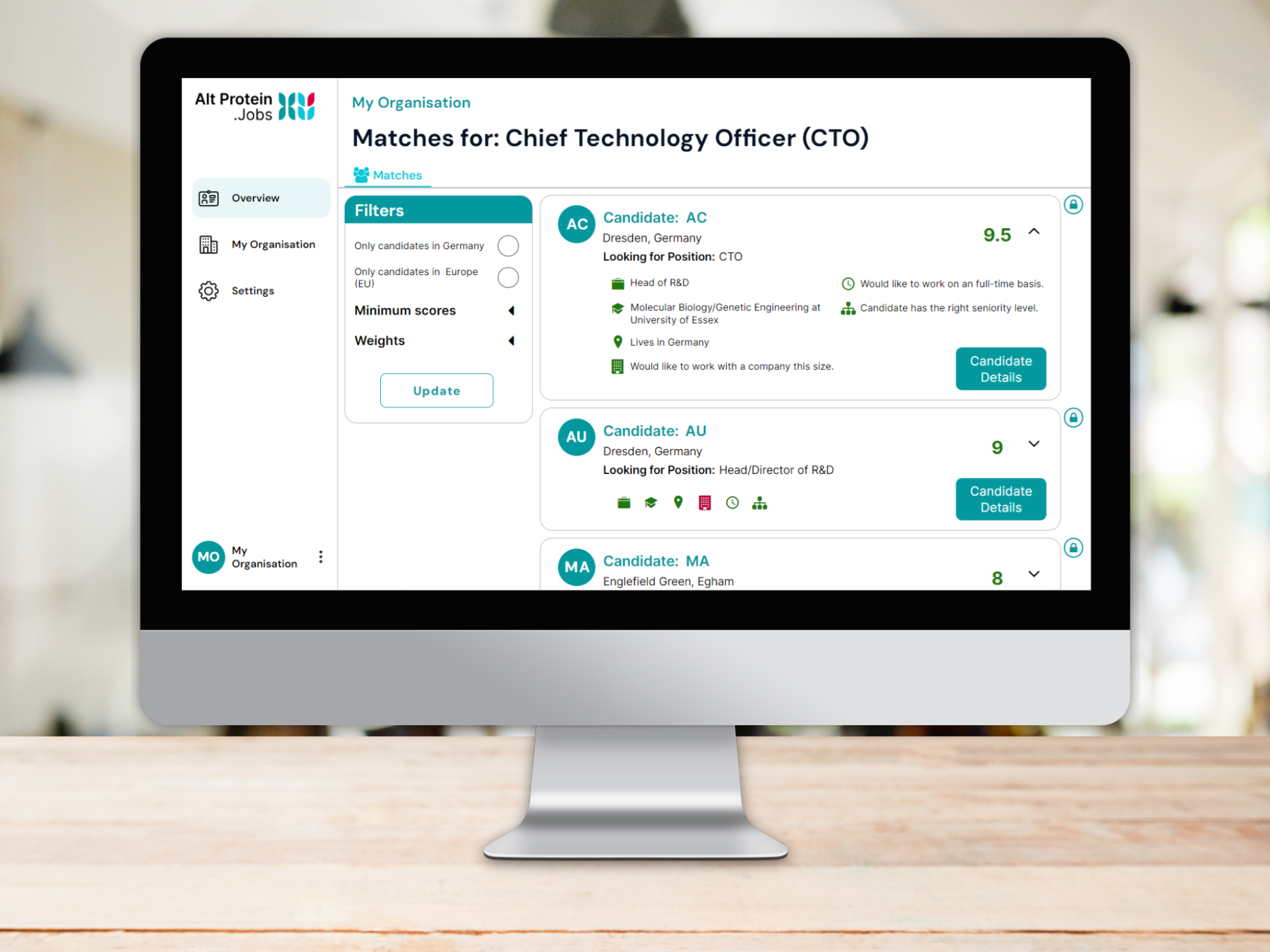What Are Employers & Jobseekers Looking for in Alternative Protein Careers?
6 Mins Read
A new analysis of job posts in the alternative protein sector shows what kind of roles are most popular, where people want to relocate to, and the disconnect with remote work.
With the right investment, the alternative protein industry – covering innovators of plant proteins, cultivated meat, and fermentation-derived foods – could support nearly 10 million jobs by 2050.
That’s around the same time the world will be in touching distance with a population of 10 billion, a number the current food system simply cannot sustain as things stand.
It’s why billionaires are pouring their wealth into research to make meat analogues so good, omnivores would willingly give up the conventional thing. It’s why companies are working across the breadth of food technology to find ways to close the gap between alternative and animal proteins – whether that’s with taste, nutrition, or price.
Today, there are over 2,000 startups in this sector. And while they have had a tumultuous couple of years, innovation is rife, as is the need for talent. One place career hopefuls can go to is AltProtein.Jobs, an AI-led jobseeking platform by German firm Tälist that connects employers in the space with prospective candidates.
To identify hiring trends in the sector, Tälist has analysed tens of thousands of data points from job postings and candidate profiles on its website, resulting in what it says is the first-of-its-kind data-driven analysis of the alternative protein talent and hiring landscape.
Here are the key takeaways from the Alt-Protein Career & Hiring Report:
Monthly job postings showcase fluctuations
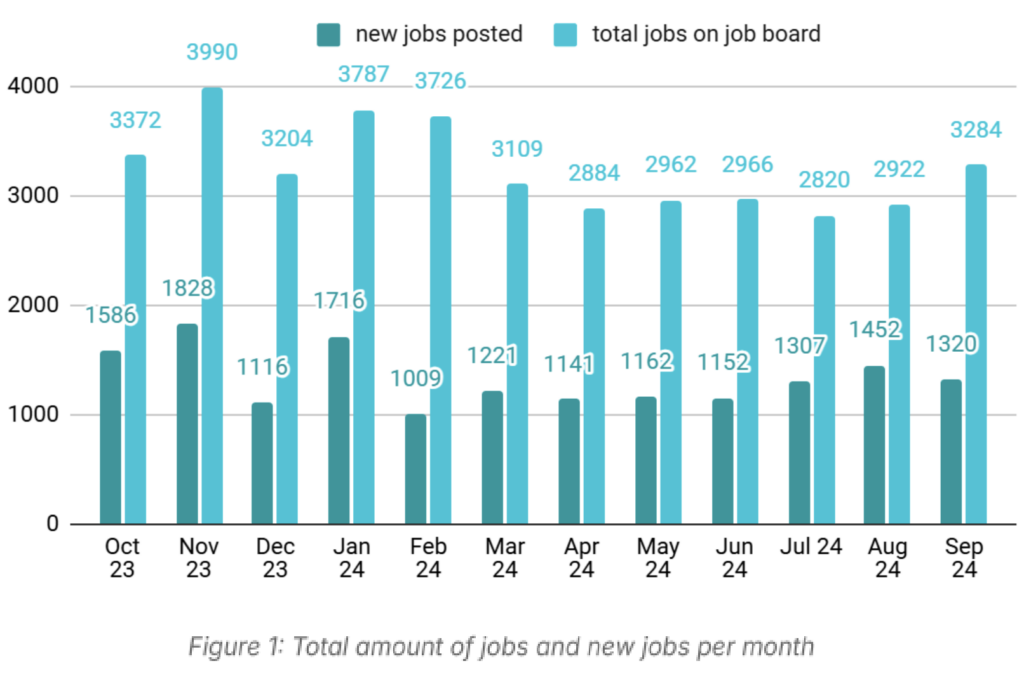
There were 16,100 jobs posted by Tälist between October 2023 and September 2024, but monthly analysis exhibited “dynamic fluctuations” – postings peaked in November and January, with another hike in August, but February and April were marked with lower activity.
The jobs platform ascribed investment rounds and seasonal budget allocations as possible factors behind these variations, but noted that the exact reasons couldn’t be determined based on the available data.
Meanwhile, company size does seem to influence hiring patterns, with larger firms showing more stability and growth in job postings throughout the 12-month period. Smaller businesses experience sharper fluctuations and tend to hire less, reflecting their more volatile funding and staffing needs.
Alt-protein job market showcases resilience despite layoffs
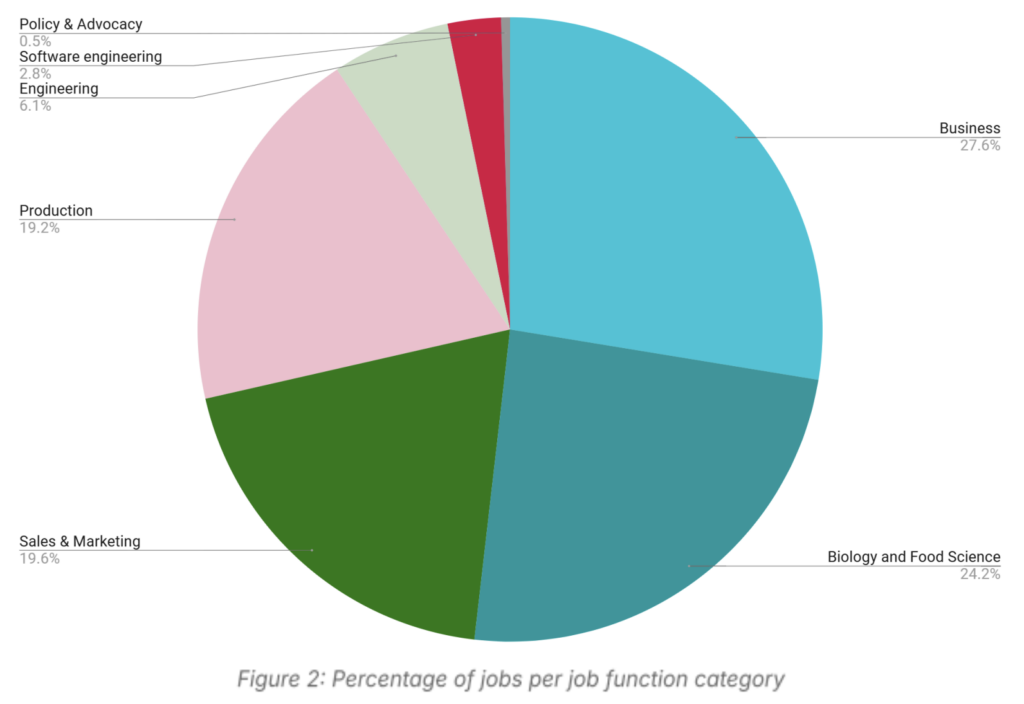
The report found fairly consistent monthly job postings with each job function category, with certain segments showing particularly strong demand. Jobs in business, biology and food science make up 52% of the total postings, while sales, marketing, and production account for another 39%.
While some of the leading industry players – from Meati to Aleph Farms – have been forced to cut jobs of late, the sector as a whole has maintained a stable trajectory when it comes to job availability. “Although layoffs have occurred, they have largely been balanced by new opportunities emerging in the market,” said Tälist.
That said, there has been no substantial increase in the number of jobs in the sector, which suggests that it is in a consolidation phase to enable future growth.
Entry- and mid-level roles most popular
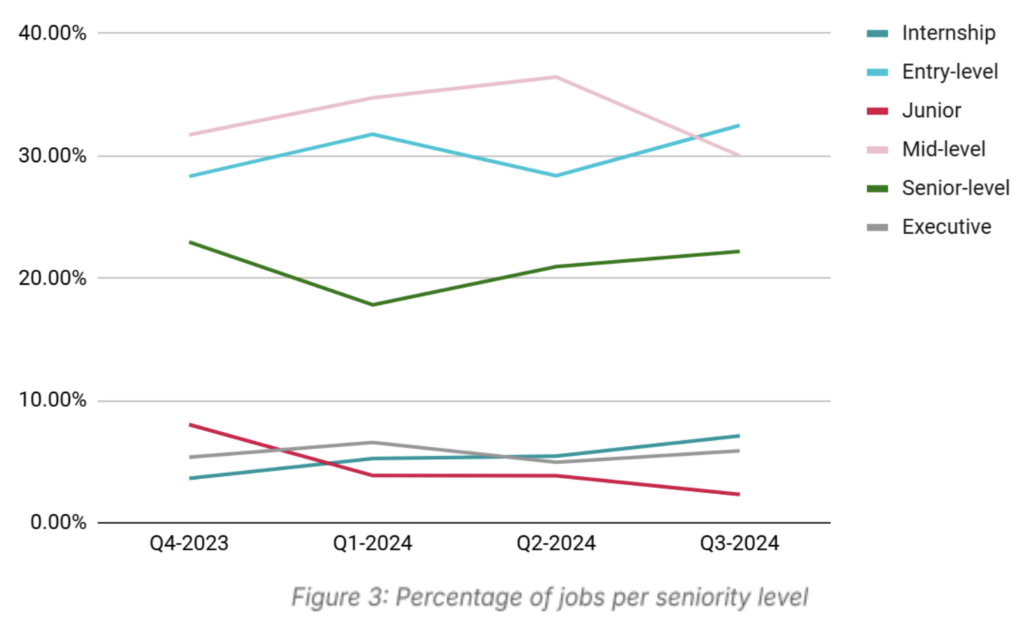
Mid-level roles are the most desired positions for companies, making up a third of all postings, followed by entry-level jobs (30%). The share of internship positions has doubled in the last year, but junior-level roles have witnessed a sharp decrease.
Interestingly, executive positions appear to be open for a longer number of days across biology and food science, production, and sales and marketing. In contrast, mid-level positions remain online longest in the engineering and business categories.
Broadly, marketing/PR and business administration are among the job functions quickest to be filled, open for 35-37 days. On the flip side, positions with job functions like downstream processing, biochemistry, bioinformatics, and food safety face longer delays (43-51).
Europe dominates – but Asia and Latin America show growth signs
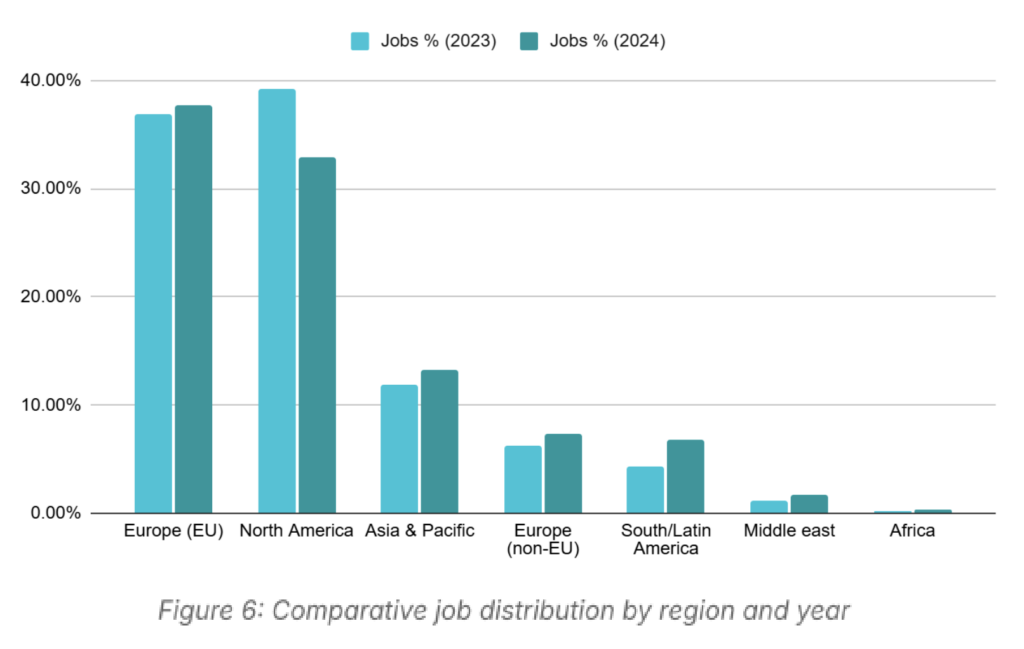
As a marker of the sector’s rapid global expansion, Asia-Pacific and Latin America witnessed a notable uptick in job postings – in fact, the latter region had twice as many roles open in 2024 compared to last year. The Middle East also had an 87% hike in job postings this year, going from 112 to 209 roles.
However, Europe now dominates this trend, featuring the highest number of job postings this year. It overtook North America, whose share fell from 39% to 33% despite a rise in absolute numbers. “[This] may suggest a market adjustment as companies re-evaluate their positions in response to economic pressures or shifts in consumer behaviour,” the report noted.
Meanwhile, 61% of candidates are willing to relocate for their jobs, whether domestically or overseas – of those, 78% are happy to move to or within the EU, and 60% would consider relocating to the US.
Indians showcase the highest willingness to move, with 87% saying so, followed by Nigerians (84%) and Swiss consumers (81%). Among the preferred destinations, the US, Germany, and the Netherlands stand out as the top choices for relocation, all hubs for future food companies.
Candidates prefer remote work and collaborative culture
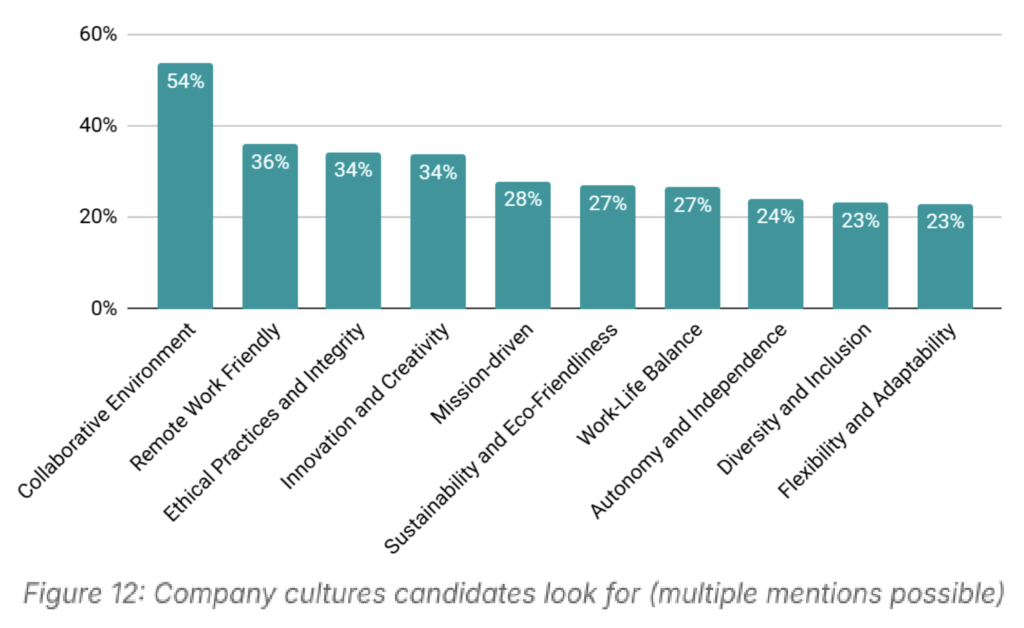
There’s a significant disconnect between the work models candidates and companies prefer. While 69% of businesses posted on-site roles, only 6% of jobseekers prefer this option.
Instead, two in five are interested in hybrid roles (with 27% of companies advertising such positions), and one in five seek fully remote jobs, though only 4.5% of positions supported this option. But crucially, 35% of prospects indicate that they’d accept any of these arrangements.
“Employers should anticipate the shift in remote work preferences among job seekers by emphasising remote and hybrid roles that could help meet candidate expectations for flexibility, therefore widening the talent pool and attracting candidates who might otherwise be less available due to geographic constraints,” the report read.
Candidates also place a high value on collaborative work environments, with 54% stressing their importance. This is followed by openness to remote work (36%), ethics (34%), and innovation and creativity (also 34%).
Plant-based roles lead the way
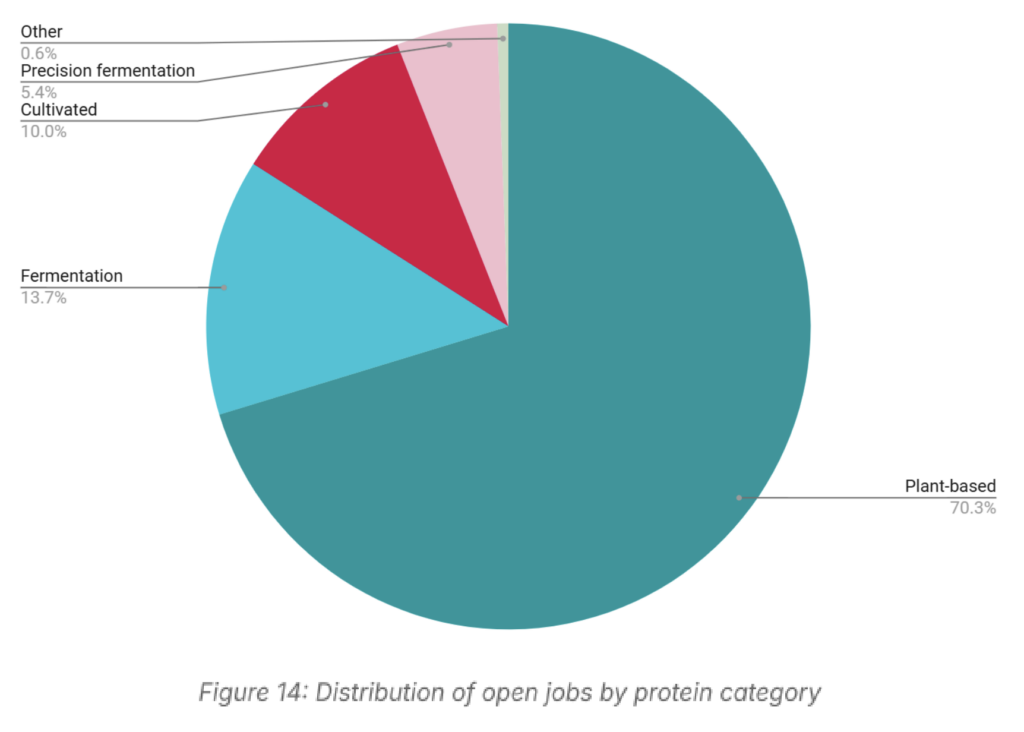
Among the different pillars of alternative protein, there’s a clear emphasis on plant-based, which should come as little surprise given this is the most advanced category in the space, featuring the highest number of companies.
These roles accounted for 70% of all job postings at Tälist. Next in line was the fermentation vertical, minus precision fermentation (19%), while one in 10 roles was in the cultivated meat space. The remaining segments, like molecular farming or hybrid technologies, took up a minute 0.6% share.
These hiring trends will further be shaped by “regulatory decisions and investor priorities”, which will dictate which technologies receive regulatory and financial support. “Additionally, we might see more shifts in regional hiring trends as local political and economic factors influence the alternative protein market,” stated the report.

